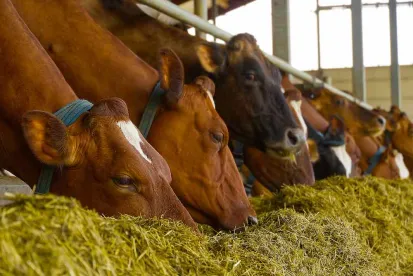On December 16, 2020, the Washington Utilities and Transportation Commission (UTC) issued a Policy Statement on renewable natural gas program design that provides important guidance for expansion of this nascent industry in the State of Washington. While not binding, the Policy Statement sets forth the UTC’s anticipated regulatory treatment for renewable natural gas, which many tout as the “next big thing” in green energy, a potentially major new industry that can tap methane produced by, for example, dairy farms and waste treatment facilities to replace natural gas produced from fossil fuels.
Background and Summary
The Policy Statement responds to Washington legislation adopted in 2019 that established both a voluntary program for consumers to purchase renewable natural gas from their utilities and a mechanism by which utilities can incorporate renewable natural gas into the supplies used to serve all retail natural gas customers. The voluntary program, codified in RCW 80.28.390, allows natural gas consumers to purchase renewable natural gas on a voluntary basis through a utility-sponsored program. The Policy Statement makes clear that all costs created by the voluntary program should be borne by the customers of the voluntary purchase program, so that regular gas customers are not required to cross-subsidize the renewable program. The Policy Statement also makes clear that the UTC must approve any such program before it is implemented, but otherwise does not impose limits on how a program may be designed.
In addition, the Policy Statement provides critical guidance for utility-sponsored programs to supply all retail customers with renewable natural gas in accordance with RCW 80.28.385. Most importantly, the Policy Statement makes clear how the UTC will calculate the statute’s mandate that the “customer charge for a renewable natural gas program may not exceed five percent of the amount charged to retail customers for natural gas.” The Policy Statement makes clear that this five percent cap will be calculated as five percent of the total retail revenue requirement for all retail gas customers, rejecting several other potential approaches to this calculation that likely would have been more restrictive. In addition, the Policy Statement makes clear that renewable natural gas programs will be reviewed under ordinary principles of utility ratemaking that require, for example, the utility to follow the approach that will yield the lowest reasonable cost and that its expenses will be subject to prudency review by the UTC.
The Policy Statement also addresses issues related to accounting for the environmental attributes of renewable natural gas. The UTC will require utilities to purchase and retain the environmental attributes associated with renewable natural gas purchased for the general supply program authorized by RCW 80.28.385, while permitting the environmental attributes for the voluntary program to be unbundled and sold separately. Environmental attributes will be accounted for using a program that hews closely to established model for Renewable Energy Credits (RECs) in Washington, which tracks the environmental attributes of renewable electricity using the WREGIS system. The Policy Statement directs utilities to develop a system of Renewable Thermal Certificates (RTCs), with each RTC representing the environmental attributes associated with one dekatherm of renewable natural gas, similar to RECs, each of which represents the environmental attributes associated with the production of one megawatt of renewable electricity. The RTC tracking system would ensure that RTCs can be bought and sold, but that they can be claimed only once. Further, the Policy Statement indicates that the UTC would provide limited banking rights for RTCs, allowing them to be claimed in the year they are produced and in either the immediately preceding year or in the year immediately after production.
The Policy Statement also requires utilities to follow existing safety and risk management approaches when transporting renewable natural gas, which may require treatment to, for example, remove impurities before it can be transported on standard natural gas pipelines.
Takeaways
The UTC’s new Policy Statement, along with a similar Oregon program, lay the regulatory groundwork for substantial growth in the Pacific Northwest’s renewable natural gas industry. Substantial growth in the use of renewable natural gas may prove to be a key driver allowing the Northwest states to meet their aggressive goals for reduction of greenhouse gases, while driving a new market for traditional industries such as dairy farms and food manufacturing facilities. In addition, renewable natural gas may provide an alternative to recently-proposed bans on the use of natural gas in new buildings, or at least a complement to such policies, and a pathway to reduce greenhouse gas emissions associated with building operations.





 />i
/>i

